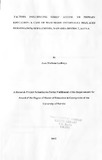| dc.description.abstract | Kenya has made progress in narrowing the gap of girls' access to education in primary schools. However, there seems to be issues in provision of education to girls in IDP camps and settlements and in particular, in Maai - Mahiu IDP settlements. The purpose of the study was to examine factors influencing access of primary education among the girl child in Maai-Mahiu internally displaced camps, Naivasha District, Kenya. To achieve this, research objectives of the study were formulated. The research objective sought to establish the influence of household factors, school-based factors and government policy factors on girls' access to primary education in Maai-Mahiu IDP camps.
Literature review was based on household factors, school based factors and policy factors affecting girls' access to education. The study was based on the Liberal feminism theory as espoused by Alison (1983) and grounded in a human rights frame work guided by a Right-Based Approach (RBA). The study adopted a descriptive survey design and targeted a population of 3 head teachers, 28 teachers and 217 pupils in Maai- Mahiu IDP camps.
A sample of 3 head teachers, 28 teachers and 105 pupils was selected for the study using simple random sampling technique. Data was collected using questionnaires for teachers and pupils and an interview schedule for headteachers which had both closed and open ended questions. Data was coded and classified into major themes from which a summary report was made. Quantitative data was analyzed using descriptive statistics supported by tables, pie-charts, frequency distributions and percentages. Data analyzed formed the basis for the research findings, conclusions and recommendations for the study.
The findings on the influence of household factors on girls' education revealed that poverty, child labour, early marriages and pregnancies are some of the leading contributors to girls dropping out of school hence key barriers to access to education. The findings further revealed that school factors such as long distance to school, inadequate facilities, few female teachers and lack of sanitary pads have impeded on the girls' access to primary education.
Further, the findings revealed that there is lack of implementation of existing laws and policies relating to compulsory and free primary education and those committed to elimination of all forms of discrimination against girls such as child labour, early/ forced marriages and readmission after child birth greatly influence girls' access to education. The study recommends that there should be commitments to eliminate all forms of discrimination and violence to create a pillar for countering the barriers to access of education by girls. | en_US |

